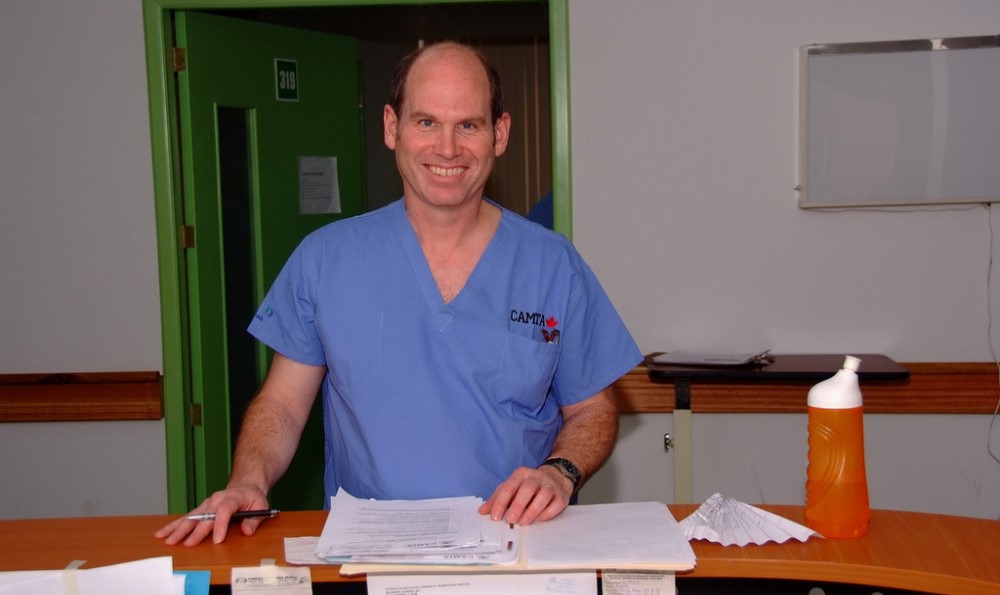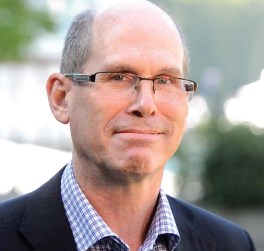
Dr. Denis Vincent
An Edmonton family doctor and a crack technology team have created an online booking system that keeps patients in the loop when they are referred to specialists for care.
Currently, many doctors rely on old-school fax machines or repeated phone calls to the offices of specialists to book patients for tests or consultations, said Dr. Denis Vincent, a family doctor in Bonnie Doon. Patients often wait anxiously at home, unaware of what specialist is being contacted and how long they’ll have to wait for an appointment. Sometimes they fall through the cracks as faxes get lost and appointments get missed.
Vincent thought there had to be a better way to communicate.
His new Medcycle system automates those bookings through a secure, private website where family doctors log in, enter patient data and request an appointment with a specialist. When the specialist accepts the patient, the patient and family doctor are notified immediately. At every point in the process, patients receive email or text updates that let them know to whom they have been referred, how to contact that specialist, their appointment date or the length of the wait list.
He created the tool after one of his patients received delayed care because of a lost fax referral. The woman, a 31 year-old mother, had gone to emergency complaining of stomach pain. An ultrasound revealed a mass on her gall bladder and the emergency doctor immediately faxed a referral to a surgeon.

A December 2013 report by the Health Quality Council of Alberta outlined a similar case involving a Calgary man who died prematurely from cancer after delayed referrals to specialists and gaps in care. The council recommended an electronic tracking and booking system be created.
Vincent’s program is just that, no software required.
“Everybody can refer to everybody and anybody,” Vincent said. A rheumatologist can refer a lupus patient to a dermatologist for skin problems. One dermatologist refers patients to another dermatologist when skin cancer is suspected. The system allows doctors to share results from blood tests, CT scans and other records. “For health outcomes, it’s prompter care, less worry.”
“This is easy,” said Vincent, and it can save money. Some primary care networks spend upwards of $1 million to hire teams of medical clerks to track all the referrals from paper binders and on phones. Medcycle only costs $50.00 per month.
“In my mind, doctors can afford this. If everybody pitches in, this service is completely viable and sustainable and it won’t cost the taxpayer a penny,” Vincent said. “We expect the government to hand everything to us. We all kick back and complain and wait for the government to fix it for us.”
But similar government projects have stalled. The myhealth.alberta.ca website, introduced in 2011, was meant to be a medical portal where patients log in to look at some personal laboratory results or pharmaceutical records. A long-term goal was to allow patients to book appointments online.
None of that happened. The website, visited 300,000 times a month, simply hosts health and wellness information.
Alberta’s Netcare system has an e-referral tool, but only for hip and knee replacement, and for breast and lung cancer. Since July 2014, 252 doctors have used the system to request 2,900 referrals. Vincent said patients aren’t looped in.
Alberta’s auditor general has been critical of the delays, especially since secure electronic systems are already in place for personal banking or education initiatives. In a September 2014 report, the auditor general said there are at least 12 different medical record systems being used by Alberta family physicians, which can’t talk to each other or share key patient information.
Front-line workers must develop the solutions, Vincent said.

